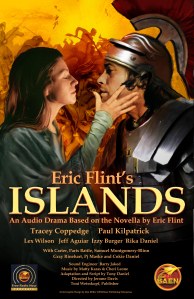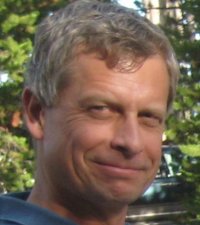The Hardest Part: Tony Daniel on "Islands"
← Coming to Town: Kim Harrison at Quail Ridge Books for The Witch with No NameThe Exploding Spaceship Visits Bookmarks! →
The Hardest Part: Tony Daniel on "Islands"
Posted on 2014-09-11 at 19:21 by montsamu
Baen editor Tony Daniel has been a busy man of late. Since his 2012 novel Guardian of Night he has published 3 additional novels (Star Trek: Devil’s Bargain and two books co-authored with David Drake: Manly Wade Wellman Award-nominated The Heretic and just-published The Savior) and two short stories, and directed and hosted Baen’s Parsec Award-nominated podcast The Baen Free Radio Hour. He’s also been active on the convention circuit, both as a panelist and (of course) as a frequent host of the Baen Traveling Road Show. In March of this year, Daniel put out a casting call for “Islands”, his new radio play adaptation of a novella by Eric Flint, and would go on to guide the production through auditions, rehearsals, recording sessions, post-production soundtrack and sound effects, and, on Wednesday September 17, Daniel will finally present the premiere performance at a free screening at Living Arts College in Raleigh, where the radio play was recorded, ahead of its online debut as part of the Baen Free Radio Hour on Friday, September 19, in turn ahead of public availability at Baen’s online store.
It was a thrill and an honor to have had a small part in the production, and to be able to take in first-hand the amazing performances of cast members Tracey Coppedge, Paul Kilpatrick, Lex Wilson, Jeff Aguiar, Izzy Burger, Rika Daniel, Carter, Paris Battle, Gray Rinehart, Pj Maske, and Cokie Daniel. (Between rehearsal takes, the talent on display just ad-libbing around for fun by this group was wonderful to be around.) Both Tony Daniel and director Jerome Davis were likewise amazing to work with, and to watch work. Here, Daniel writes about his background in script writing, and how “Islands” came to be.
By Tony Daniel:
We made radio plays back in 2000 and 2001. I got hired at Seeing Ear Theatre at SCIFI.COM by its creator, Brian Smith, who later became a good friend and writing partner, and we made many radio plays with wonderful, cinematic soundtracks, quite unlike anything that had been made before, because they, those who created and developed the form, and created its Golden Age, simply didn’t have the technology before. We had a wizardly sound engineering genius named John Colucci. We had a great budget to work with, so we hired stars to get more people to listen. For about two years, I was perhaps the only full-time audio drama scriptwriter and story editor in the world. At least in America. Then the dot com bust came along, and the whole thing, the whole web site, got shut down to ashes. Probably a hundred people laid off, poor kids suddenly out $65,000 a year and with no prospects except Starbucks, if that. To be laid off in New York City is no joke. You will quickly get eaten alive by rent.
Brian, by the way, took a job as an audiobook editor after Seeing Ear, and then quit and started an artisanal ice cream shop in Brooklyn. It has become a New York phenomenon. Ample Hills. You have to go there when you’re in town.
On the side, and probably what got me the job at SCIFI, was that I also had a small troop of actors I’d gotten together in a Don Quixoteish venture called Automatic Vaudeville, after the big nickelodeon cinema barn in NYC of yore. At first we pretended to be on the radio. We performed at a coffee house in Tribeca where I worked. Then Jim Freund heard about us, and we went on his science fiction oriented show on WBAI, Hour of the Wolf, and we did a performance for about two years once every month or so. It was exhilarating. Usually about seven actors and a live band, the Trouble Dolls. Call time was 5 a.m. Saturday morning. Or was it 4:30? A couple of times we simply didn’t go to sleep Friday night. The idea was it was the radio show of urban faery coming in sideways over your radio, or something like that. I wrote them all, mostly, and directed. We did some amazing work, much of it captured only on scratchy cassettes now.
We didn’t make any money, of course. But I did get married out of it. Rika was one of the actors. It was incredibly fun. Making radio plays at SCIFI was also incredibly fun, in a different way. More importantly, what we made was good stuff, each in its own way. You can still find Seeing Ear Theater plays online. Automatic Vaudeville shows, well, I may have the only copies anymore.
The hardest part was giving up writing and directing drama and returning to fiction. Transitioning. I had grown so very tired of science fiction in the 1990s. Not science fiction itself, or fans, just the writers and professionals in the field. It was such a huge relief to stretch outside of that demented community and find people who were just as weird and often more artistic, but not insanely committed to a genre as if it were a religion. Science fiction is a literary tool. That is all it is or ever can be. There is no such thing as the future or alternate realities. There is just reality. Science fiction is about now or it isn’t about anything at all.
Really, the only way I could get back into SF was by going traditional. I had tried avant garde in the 90s and I realized there wasn’t much else I could do with it that I hadn’t done. So when I decided to write SF again, I wrote a novel about two guys in a space navy and an alien commander wanting to defect over to the human side of an interstellar war. And I took on coauthoring in another writer’s milieu gladly. And I took on writing Star Trek novels gladly. Because that’s what you do when you’re an artist. You explore new forms and forms new to you. You don’t fuck around caring what this or that person thinks about what you’re doing. It is a grand waste of time to think much about the accouterments of writing at all—which is one reason writing this essay gives me the heebee jeebees. Usually, whenever I see a writer talking about themselves or pontificating about the world (as if they had any kind of useful moral perspective) I run away as fast as possible. Writers are, in general, intellectual lightweights—but lightweights who often think they are heavy hitters because they get confused about value-driven work. Art has nothing to do with justice. Art has nothing to do with thinking, except to use thought as a means to an end. Art is about evoking feeling. Nothing else. Ever.
Then I got the chance to make more radio plays at Baen, where I took a job as editor a few years ago. My first thought was to adapt Eric Flint’s novella, “Islands,” which is my favorite thing he’s written. I’d first read it when I wrote ad copy for a Locus ad for one of his and David Drake’s Belisarius series books, and it had blown me away. So I wrote the script, and Eric liked it. And away we went …
Actors. Music. Microphones. Recording software. Post production. Cover art. Press releases. Debuts. Hoping to God somebody will listen and be moved in some way, that it will make their day more interesting, lighten their load, and entertain them.
Doing this makes me very happy. So does editing. So does writing books.
Hell, maybe there isn’t any hard part at all.
Tony Daniel is an editor at Baen Books and an author. At Baen, he works with writers such as David Weber, Eric Flint, John Ringo, Lois Bujold, Sharon Lee and Steve Miller, Larry Correia, and many others. He’s the author of ten science fiction novels, the latest of which is Guardian of Night, as well as an award-winning short story collection, The Robot’s Twilight Companion. He is the author of many short stories, some of which have been collected in several Year’s Best anthologies. Daniel is a Hugo finalist and winner of the Asimov’s Reader’s Choice Award for his story “Life on the Moon.” For several years, Daniel was the writer and director of Automatic Vaudeville, a radio show that appeared on WBAI New York. He was also a writer and producer at SCI-FI.COM’s Seeing Ear Theatre where such talent as Stanley Tucci, Oliver Platt, Kyra Sedgwick, Peter Gallagher, Luke Perry, Gina Gershon, and many others appeared in his adaptations of science fiction stories and novels as well as his own original dramatic work. Daniel is the screenwriter, with Brian Smith, of two movies that have appear on SyFy and the Chiller channels. He is the author of two Star Trek novelizations, Devil’s Bargain and upcoming Savage Trade, and is the coauthor, with David Drake, of General series entries The Heretic and The Savior. He lives in Wake Forest, North Carolina with his wife and two kids, where he is currently working on a fantasy novel.


